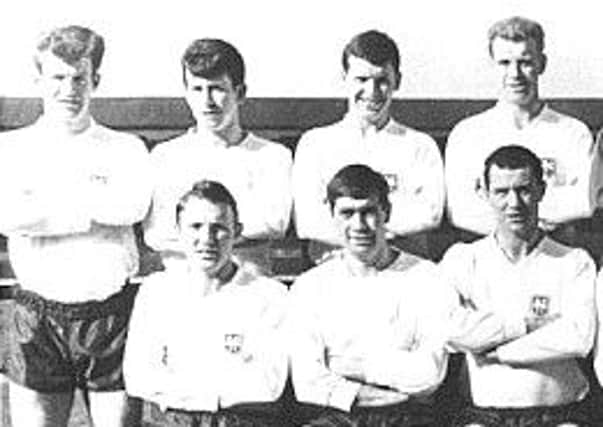Obituary: George Ross, footballer


Scottish footballer George Ross played almost 500 senior games in a career in England spanning three decades, from the 1950s to the 70s. Synonomous with Preston North End whom he joined as a 15-year-old from Inverness in 1958, his first team debut took place on Boxing Day 1960 in the old First Division against Nottingham Forest while his final appearance for the “Lilywhites” was against Blackpool in April 1973.
The undoubted high point of his time at Deepdale was the FA Cup Final against West Ham in 1964 in front of 100,000 people at Wembley when a last minute Hammers’ goal won the game 3-2. Ross was an ever-present player in the Cup run, playing in all eight games, distinguishing himself particularly in the semi-final success over Swansea with one report commenting: “Special praise is due to George Ross who played splendidly in coping with a fast and dangerous opponent.”
Advertisement
Hide AdAdvertisement
Hide AdAt this time the final was the showpiece game of the season and in the build up to it, Preston had gone “FA Cup Final mad”, with the club’s Scottish manager, Jimmy Milne, deciding to take the squad away to the Isle of Man to avoid the distractions at home. On the day of the big game, Ross was later reported to have said: “I did not walk out of that famous Wembley tunnel, I floated out!”
Two other Scots were teammates, Aberdeen-born centre forward Alex Dawson and fellow full back Jimmy Smith from Arbroath. United featured Bobby Moore, Martin Peters and Geoff Hurst who would of course go on to win the World Cup with England two years later.
Regarded as one of the best finals ever for its quality of play, it lacked nothing for excitement and drama as reflected in the 39 attempts on goal that kept spectators gripped. Although defeated, North End could hold their heads high and were given a heroes’ welcome on their return when 80,000 thronged the streets.
A procession led by the Brindle brass band conveyed them to the Town Hall where the Mayor announced from the balcony: “You provided one of the greatest shows ever seen at Wembley. Thank you for the glory you brought to Preston.” Players were then introduced individually to speak to the crowds, with Ross stating to loud applause: “As a Scotsman I am a foreigner among you but I feel I’m part of you now.”
That was not Ross’s first brush with FA Cup success as in 1960 he played in the Youth Cup final when Chelsea defeated them. Although a full back with Preston – described as “a tough tackling no nonsense defender” – he began as a wing half (midfielder)with amateur team Hilton Athletic in his native Inverness. There he was spotted by Preston’s Scottish scout, Jimmy Scott, who saw him score a hat trick in a game when he played at centre forward and after a two-week trial at Deepdale he joined the groundstaff as apprentice pro aged 15. At that time the team boasted the legendary Tom Finney, while Willie Cunningham Scotland’s 1954 World Cup captain played full back, a daunting twosome for the young Ross to seek to emulate.
He did play one game in the same team as Finney while a youth member of the first team squad taken on a Swiss tour in 1960. Once established as a regular from 1961 onwards he played alongside Cunningham initially before replacing him.
Throughout the 1960s the right back shirt was virtually his own as he became one of the team’s most consistent and popular players. Then Scottish team manager Ian McColl was known to have watched him a few times in 1962 and 63 but did not select him.
Although his initial games were in the old First Division, Preston were relegated in 1961 and again in 1970 to the old Third Division. They returned the next year as champions, Ross playing a crucial role as a virtual ever-present in 43 games.
Advertisement
Hide AdAdvertisement
Hide AdAfter his final match against Blackpool, he moved to old Third Division Southport whom he captained, playing some 30 games and where his manager was Willie Cunningham. A spell with Washington Diplomats in the NASL followed, where the manager was Dennis Viollet who had been assistant manager at Preston in Ross’ latter years.
On returning to England he played non league for a couple of seasons with Telford United and Morecambe before hanging up his boots.
He maintained his interest in the game coaching his local Preston amateur team, Fulwood, while continuing to live in the town and working for many years in the logistics section of the British Aerospace factory. He also enjoyed playing golf and snooker.
In 1998 he was appointed chairman of the Preston Former Players’ Association a post he held for many years, at the same time acting as a club ambassador/host on matchdays, carrying out these functions with distinction. Highly thought of and popular, the club gave him a Lifetime Achievement Award in 2009 to reflect his long-term contribution.
Having attended the last match of the season against Leeds United, he died later that evening.
He is survived by wife Pat, and sons Andrew and Graham.